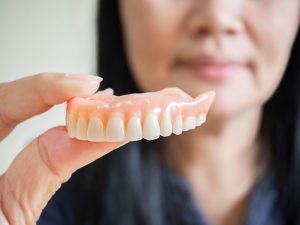Dentures are the tried-and-true method for refurbishing smiles after tooth loss because they restore so much of your ability to eat and speak like you used to. If you’ve only recently been fitted for them, though, you might be unpleasantly surprised to find that you’ve developed some sores and irritation along your gums. Though not ideal, it’s normal for your mouth to react this way while you’re adjusting to your new prosthetic teeth. Fortunately, there are things you can do to relieve and repair these abrasions. Keep reading to learn about 4 tips that can help!
Tip #1: Manage Discomfort
It can take a couple of weeks to become accustomed to having dentures in your mouth, but there’s no need for you to suffer through it. If your gums feel swollen or achy, usually over-the-counter medicines like ibuprofen or Tylenol are safe to take. You can also find numbing gels intended to be used in your mouth that can be applied directly to any sore spots.
Tip #2: Rinse with Salt Water
Salt is a natural disinfectant and anti-inflammatory and is often recommended to clean your mouth when it’s wounded. Try mixing ¼ teaspoon of salt into ¼ cup of warm water and stir it until it’s fully dissolved. Then, swish the solution in your mouth for about 30 seconds then spit it out. You can repeat this process 3 to 4 times a day as needed until any raw areas have healed.
Tip #3: Take Time to Rest
After a long day, it can be easy to forget that you’re wearing dentures and accidentally fall asleep with them still in your mouth. This can cause problems for a couple of reasons. Firstly, your gums aren’t likely to recover if they’re never given a reprieve from having prosthetics pressed against them. Those sores need a break to clear up. On top of that, toxic bacteria love gathering in the space between your dentures and your gums which could cause gum disease or infect any open lesions.
Instead, place your false teeth in a glass of cool water or denture cleaning solution overnight. This eradicates unwanted germs and gives your mouth some much-needed rest.
Tip #4: Call Your Dentist
Though it’s standard to notice some blisters or sores while learning to accommodate your dentures, if it doesn’t clear up after a couple of weeks then you should reach out to your dentist. It’s possible that they aren’t fitting as intended and need to be relined or potentially replaced, depending. Only your dentist has the expertise and instruments necessary to identify the root problem to address it.
Thankfully, most patients adjust relatively quickly so you won’t be dealing with denture sores for long!
About the Author
Dr. Jennifer Pham has more than a decade of experience providing patients with top-quality dental services, including dentures. She graduated from James Madison University with a Bachelor of Science in Biology and her Master of Science Degree in Biomedical Sciences from Barry University in Miami. She then earned her Doctorate of Dental Medicine at Temple University School of Dentistry in 2010 and has continued developing her skills since then. Using the latest techniques and technology means that you’ll get accurate, beautiful results intended to last. If you’re worried about ill-fitting dentures, you’re welcome to request an appointment on the website or by calling (703) 666-3867.

